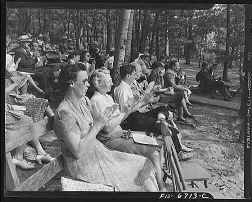“I would have written a shorter letter, but I did not have the time.”
Author: Ellen Cline; Published: May 11, 2011; Category: Business Writing, Communications Tools, Editing and Proofing, Message Simplicity; Tags: Business Writing, critiquing marketing materials, editing, Persuading Readers, Simple Message, writing; No Comments

Often time is limited and something needs to go out now. As Blaise Pascal stated, "I would have written a shorter letter, but I did not have the time." In other words, writing fast and writing concisely are often at odds.
I do a profile each week for the Church of Beethoven. I have 140 words and maybe 15 minutes to do it.
For tweets from Working Like Dogs and National Assistance Dog Week (@WLDogs and @NADWeek) which I started doing recently, I have 140 characters and no time.
What do I get out of it? For the 140-word Church of Beethoven profiles, I interview an audience member or volunteer before or after the show. The profile appears in the weekly e-news that goes out on Wednesdays. I learn a lot of amazing things about the people, their interests, their background, and their work, so that’s fun.
For the 140-character tweets, which I actually almost always do through Facebook (trying to save time by posting once), I have to skim news items and figure out what the main point is, then make it short. So like the profiles, I learn a lot, but am always in a hurry, struggling to be efficient, accurate, yet hopefully interesting.
But what about the readers? What do they get out of it? Are these items reaching and teaching or motivating them?
Now that we have less time and space than ever, are we getting better at focusing our messages? Or just creating large quantities of short and not very meaningful messages?
There have always been limitations for marketing professionals: the ¼ page print ad, the billboard, the :15 second spot, the text link on the web page. And of course there’s editing to fit the space: I just had to cut someone’s op-ed down from 1200 words to 600.
But do extremely short messages, like tweets, push us even further? And do they really help us communicate effectively?
It’s not just brevity, but speed. When we have to get something out before it is no longer news, that makes it a rush. When we have to make it short, and do it fast, have we gone beyond what is possible?
Going back to that quote from Pascal—everyone seems to understand that writing short takes more time. But in the current zeitgeist we are expected to do both, fast and short, each and every time. Is this really working?
What’s it like being a freelance writer?
Author: Ellen Cline; Published: Mar 28, 2011; Category: Business Writing; Tags: Business Writing, writing; No Comments

Students in a professional writing class at UNM asked me to answer some questions about being a freelance writer. I realized maybe the things they were asking about were questions others might have as well.
My work is mainly centered on helping people market their products and services. Whether writing web content or a press release, I’m generally helping organizations develop their marketing messages and materials.
The students wanted to know what qualities were needed to be successful. I said self-motivation and flexibility.
I told the students you have to be able to obtain and organize your own work, and meet deadlines. You have to be able to learn new topics very quickly. If something changes on a project, you need to be ready to switch gears. Providing good customer service is essential.
When they asked about the best parts of being a freelancer, I said the ability to choose clients and be in charge of your own work. If you have a variety of clients, you can also learn about a wide variety of topics. This is fun if you are a person who enjoys learning.
Then they asked about bad experiences, and if I’d had any. I said, of course, if you are in any type of business you are going to have bad experiences. The client needs to value what you do. If they don’t see the value in what you do, there will be conflicts.
Another dangerous category of work is when someone wants you to “fix” a project someone else has started. That generally is a formula for disaster. Start fresh.
Over the years, I’ve experienced the good, the bad and the strange with various clients and potential clients. Whether it’s slow payment or someone wanting to read my palm at a first meeting, I’ve seen a lot, although I’m sure not all.
Right now I genuinely like my clients and have good relationships with them. Is this a result of luck or my many years of experience? I think a little of both.
Attracting the Creative Consumer
Author: Ellen Cline; Published: Dec 6, 2010; Category: Business Writing; Tags: Business Writing, promoting nonprofits, Public relations; No Comments

I attended a symposium on the creative economy recently. Because I am part of the communications team and do PR for the Church of Beethoven, I was particularly interested in hearing from the professionals taking part in a panel discussion about the creative consumer.
Who are these people and how do you attract them?
Sophie Martin, of Sophie Martin PR, said one of the main audiences is someone she calls “Elaine,” an empty nester who now has the time and money to attend art and theater events. She is college educated and has been exposed to the arts. Elaine wants to support the arts and she wants to attend with her partner, friend or a group with whom she can discuss the event.
Then there’s “Nate,” a young man who has an interest in bonding with his male friends or getting lucky with a date. He has different expectations than Elaine. Nate wants to have new experiences and topical subjects to talk about.
Along with their hopes for arts and entertainment events, they both have concerns. Elaine is afraid of dangerous situations or driving at night. Nate is worried about unexpected costs. He wants to be clear about what food or parking costs because he doesn’t want to look bad in front of his friends.
Chantal Foster, a web architect, said she sees people trying to launch an advertising campaign to everyone, which of course doesn’t work. She asked how arts organizations can better focus and identify their audiences.
Martin replied that you can go see your colleagues and see who is showing up at their performances, or even look at other cities similar to yours and see what they’re doing. But she said one of the best and most inexpensive things an organization can do is to survey their existing audience. Talking to them gives you a window on who else is out there and how to reach them.
One more point Martin made: Your biggest competition is everything and nothing. It’s all the other arts and entertainment options and it’s people just sitting at home.
Hakim Bellamy, a poet and musician, added that your “competition” is your audience, too, so collaborate and work together.
Hearing all this I got some new ideas but also confirmation that some of the things we’re doing at the Church of Beethoven are the way to go.
We ran a survey for the Church of Beethoven audience members not long ago. We had a very good response rate and now need to more systematically analyze the information we collected. I’m looking forward to seeing what we can learn from the results.
